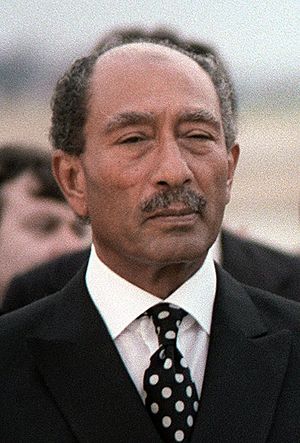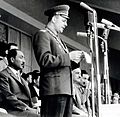Anwar el Sadat facts for kids
Quick facts for kids
Muhammad Anwar al Sadat
محمد أنورالسادات |
|
|---|---|
 |
|
| 3rd President of Egypt 2nd President of the United Arab Republic |
|
| In office 15 October 1970 – 6 October 1981 |
|
| Preceded by | Gamal Abdel Nasser |
| Succeeded by | Hosni Mubarak |
| Personal details | |
| Born | 25 December 1918 Mit Abu al-Kum, Egypt |
| Died | 6 October 1981 (aged 62) Cairo, Egypt |
| Political party | Arab Socialist Union (until 1977) National Democratic Party (from 1977) |
| Spouses | 1) Ehsan Madi 2) Jehan Sadat |
| Signature |  |
Muhammad Anwar el-Sadat (born December 25, 1918 – died October 6, 1981) was the third President of Egypt. He was president from October 15, 1970, until he was killed on October 6, 1981. He was a very important leader in the Middle East.
Contents
Anwar Sadat's Early Life
Anwar Sadat was born in 1918. He grew up in a big family with 13 children. He went to a special military school. After he finished school, he was sent to a military base. There, he met Gamal Abdel Nasser and they became close friends.
Sadat and Nasser joined a secret group of young soldiers. This group was called the Free Officers. They worked together to overthrow the old royal family in Egypt. This happened during the Egyptian Revolution of 1952. After the revolution, Nasser became president. Sadat worked as one of Nasser's important ministers until Nasser died in 1970.
Sadat's Time as President
When Nasser died, Sadat was chosen to be the new president. Some people thought he would not be president for long. They believed they could easily control him. But Sadat surprised everyone. He was president for eleven years. During this time, he changed many things that Nasser had started.
The October War
On October 6, 1973, Sadat started a war with Syria against Israel. This war is known as the October War. Their goal was to get back land that Israel had taken from them. This land was captured six years earlier in the Six-Day War.
The Egyptian army did very well at the start of the war. They crossed the Suez Canal and moved into the Sinai Peninsula. This surprise attack shocked Israel and the rest of the world. Because of this success, Sadat became a hero in Egypt. For a while, he was also seen as a hero across the Arab world.
Making Peace with Israel
In 1977, Sadat made a brave decision. He visited Israel and spoke to their parliament, the Knesset. He talked about how to bring peace between Egypt and Israel. He was the first Arab leader to visit Israel and officially recognize it as a country.
In 1978, Sadat signed a peace treaty with Israel. This happened after talks called the Camp David Accords. For his efforts, he won the famous Nobel Peace Prize. However, this peace treaty made many other Arab nations unhappy. They did not support making peace with Israel. Because of this, Egypt was temporarily removed from the Arab League.
Sadat's Death
Many people, especially some groups who wanted a strict Islamic government, were very angry about the peace treaty. They planned to take over the Egyptian government. They also wanted to kill the main leaders. Their goal was to make Egypt an Islamic country again, instead of a country with a non-religious government.
In 1981, the Egyptian government learned about this plan. Sadat ordered the arrest of over 1500 people. He thought they might be part of the plot. These arrests included many different kinds of people. However, Sadat missed a group of these people who were in the military. This group was led by Lieutenant Khalid Islambouli.
Assassination and Funeral
On October 6, 1981, this military group killed Sadat. This happened during a parade celebrating the crossing into the Sinai Peninsula during the October War. Eleven other people were also killed in the attack. Many more were hurt. At the same time, some of these groups took control of the city of Asyut for a few days.
Sadat's funeral was a very big event. Many important leaders from around the world came. These included former US Presidents Gerald Ford, Jimmy Carter, and Richard Nixon, and current President Ronald Reagan. But only three Arab countries sent representatives. Only Sudan's leader attended. Sadat's vice-president, Hosni Mubarak, became the new president.
Images for kids
-
Sadat shaking hands with Salah Zulfikar. Cairo, 1976
-
Top Egyptian leaders in Alexandria, 1968. From left to right: Gamal Abdel Nasser, Sadat, Ali Sabri and Hussein el-Shafei
-
Sadat (left) shaking hands with Israeli Defense Minister Ezer Weizman, 1978
-
President Anwar Sadat and Israeli Prime Minister Menachem Begin acknowledge applause during joint session of Congress in Washington, D.C., during which President Jimmy Carter announced the results of the Camp David Accords, 18 September 1978
-
President Jimmy Carter shaking hands with Sadat and Israeli Prime Minister Menachem Begin at the signing of the Egyptian–Israeli Peace Treaty on the grounds of the White House, 1979
-
President Sadat with U.S. Senator Joe Biden (left), and U.S. Senator Frank Church (center), at Camp David, 1979.
-
Queen Farah Diba, President Anwar Sadat and Shah Mohammad Reza Pahlavi in Tehran in 1975
-
Yuri Gagarin with Sadat and Gamal Abdel Nasser in Cairo, 1962
See also
 In Spanish: Anwar el-Sadat para niños
In Spanish: Anwar el-Sadat para niños











